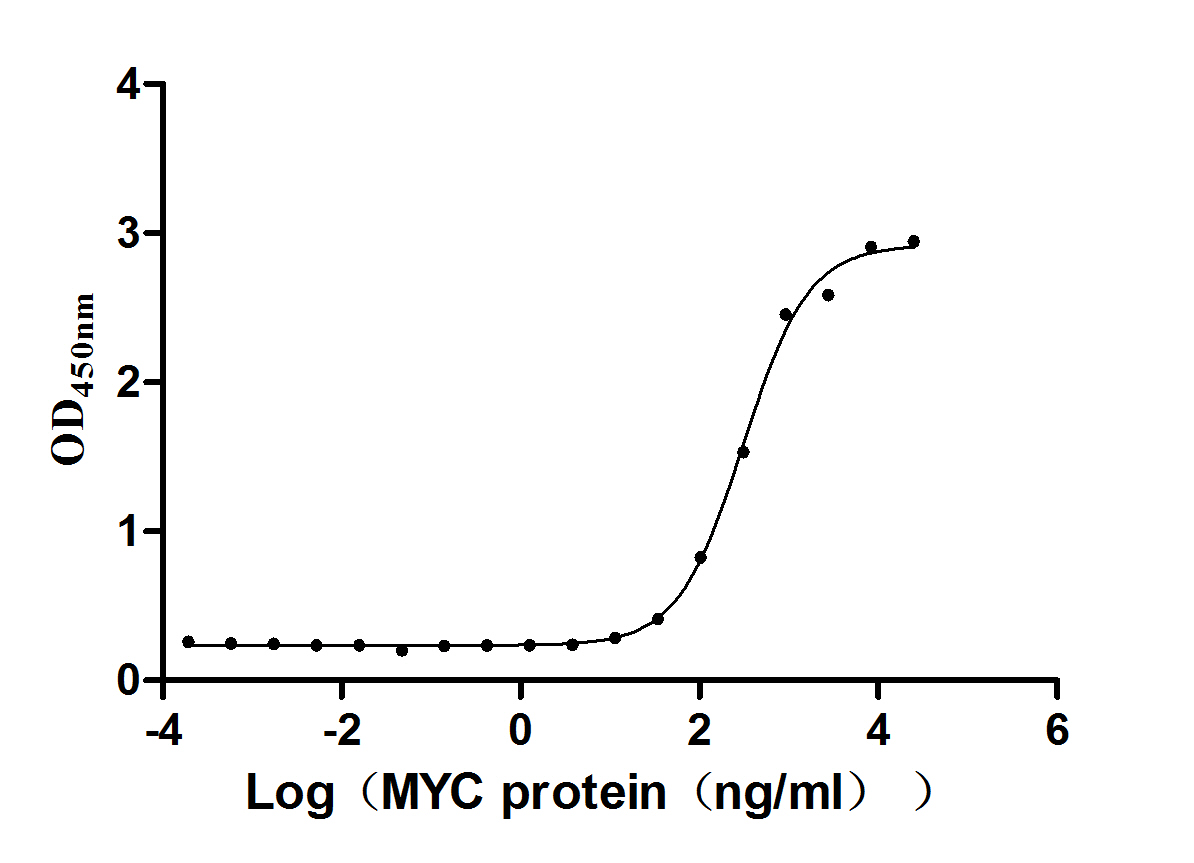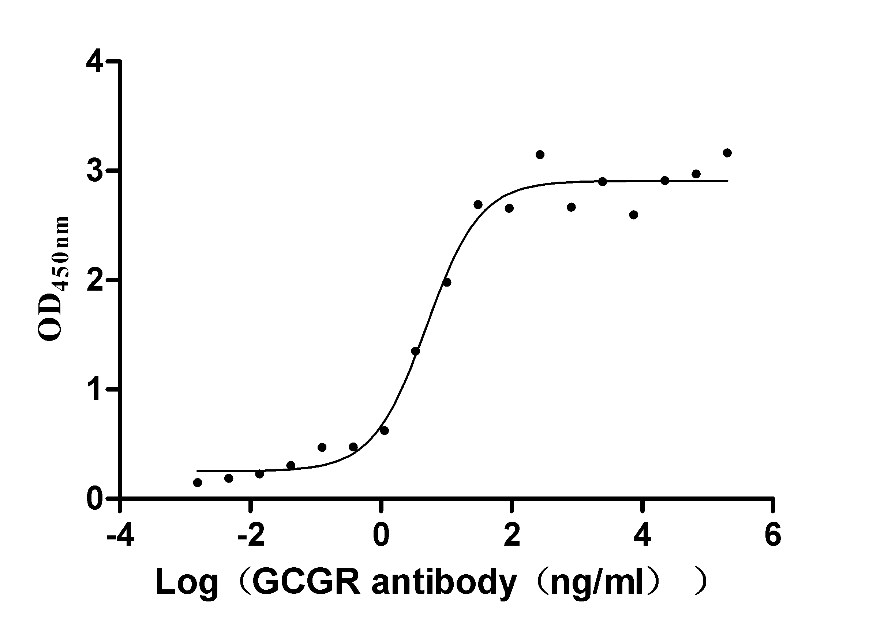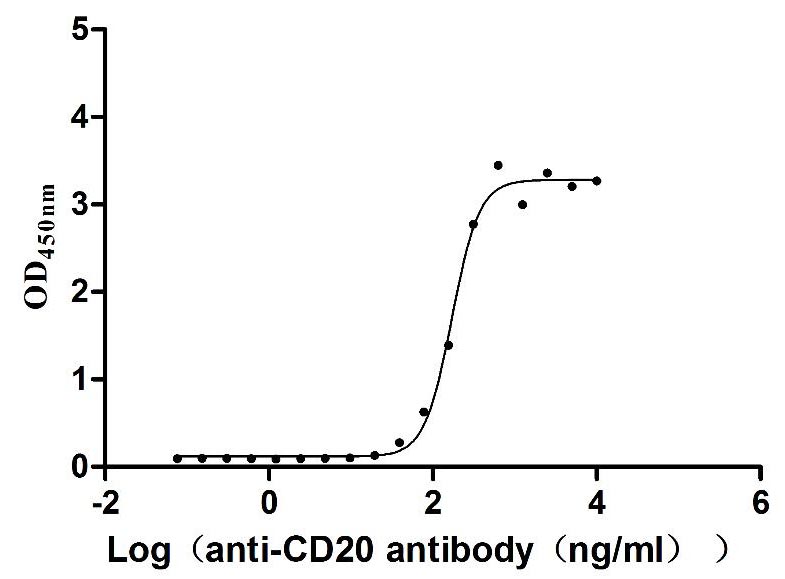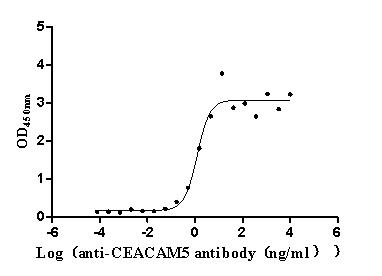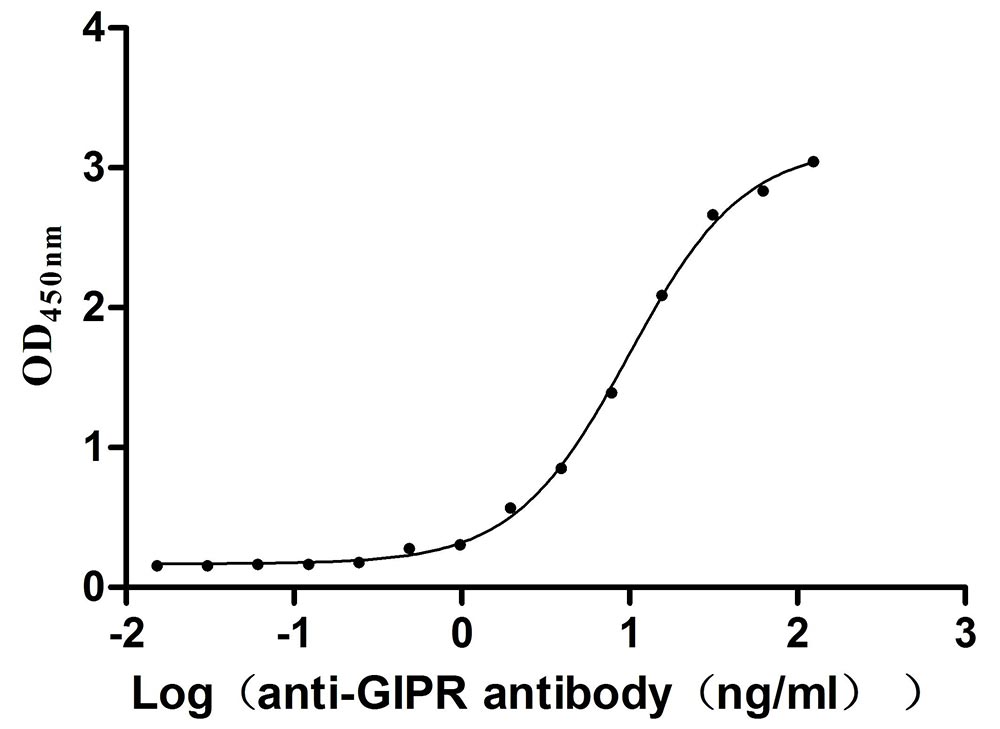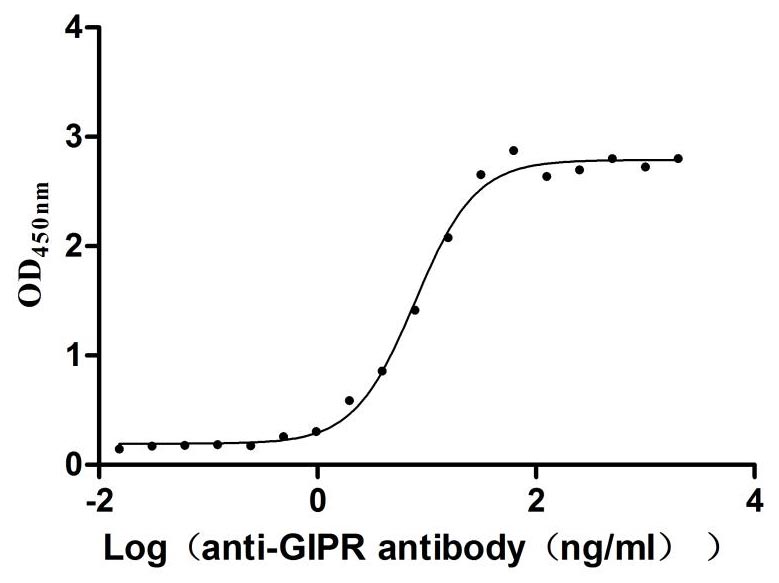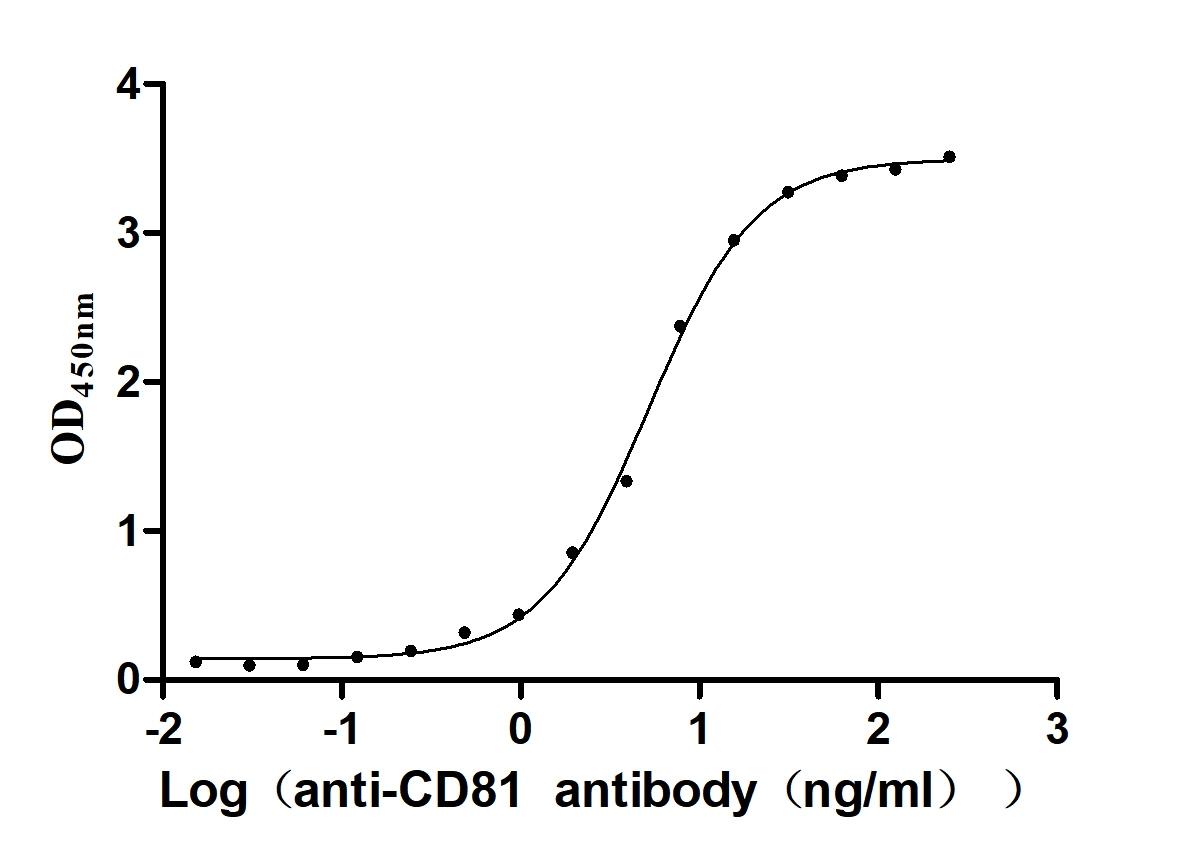Recombinant Mouse IgG receptor FcRn large subunit p51 (Fcgrt), partial
-
中文名称:小鼠Fcgrt重组蛋白
-
货号:CSB-YP717217MO
-
规格:
-
来源:Yeast
-
其他:
-
中文名称:小鼠Fcgrt重组蛋白
-
货号:CSB-EP717217MO-B
-
规格:
-
来源:E.coli
-
共轭:Avi-tag Biotinylated
E. coli biotin ligase (BirA) is highly specific in covalently attaching biotin to the 15 amino acid AviTag peptide. This recombinant protein was biotinylated in vivo by AviTag-BirA technology, which method is BriA catalyzes amide linkage between the biotin and the specific lysine of the AviTag.
-
其他:
-
中文名称:小鼠Fcgrt重组蛋白
-
货号:CSB-BP717217MO
-
规格:
-
来源:Baculovirus
-
其他:
-
中文名称:小鼠Fcgrt重组蛋白
-
货号:CSB-MP717217MO
-
规格:
-
来源:Mammalian cell
-
其他:
产品详情
-
纯度:>85% (SDS-PAGE)
-
基因名:
-
Uniprot No.:
-
别名:Fcgrt; Fcrn; IgG receptor FcRn large subunit p51; FcRn; IgG Fc fragment receptor transporter alpha chain; Neonatal Fc receptor
-
种属:Mus musculus (Mouse)
-
蛋白长度:Partial
-
蛋白标签:Tag type will be determined during the manufacturing process.
The tag type will be determined during production process. If you have specified tag type, please tell us and we will develop the specified tag preferentially. -
产品提供形式:Lyophilized powder
Note: We will preferentially ship the format that we have in stock, however, if you have any special requirement for the format, please remark your requirement when placing the order, we will prepare according to your demand. -
复溶:We recommend that this vial be briefly centrifuged prior to opening to bring the contents to the bottom. Please reconstitute protein in deionized sterile water to a concentration of 0.1-1.0 mg/mL.We recommend to add 5-50% of glycerol (final concentration) and aliquot for long-term storage at -20℃/-80℃. Our default final concentration of glycerol is 50%. Customers could use it as reference.
-
储存条件:Store at -20°C/-80°C upon receipt, aliquoting is necessary for mutiple use. Avoid repeated freeze-thaw cycles.
-
保质期:The shelf life is related to many factors, storage state, buffer ingredients, storage temperature and the stability of the protein itself.
Generally, the shelf life of liquid form is 6 months at -20°C/-80°C. The shelf life of lyophilized form is 12 months at -20°C/-80°C. -
货期:Delivery time may differ from different purchasing way or location, please kindly consult your local distributors for specific delivery time.Note: All of our proteins are default shipped with normal blue ice packs, if you request to ship with dry ice, please communicate with us in advance and extra fees will be charged.
-
注意事项:Repeated freezing and thawing is not recommended. Store working aliquots at 4°C for up to one week.
-
Datasheet :Please contact us to get it.
相关产品
靶点详情
-
功能:Cell surface receptor that transfers passive humoral immunity from the mother to the newborn. Binds to the Fc region of monomeric immunoglobulin gamma and mediates its selective uptake from milk. IgG in the milk is bound at the apical surface of the intestinal epithelium. The resultant FcRn-IgG complexes are transcytosed across the intestinal epithelium and IgG is released from FcRn into blood or tissue fluids. Throughout life, contributes to effective humoral immunity by recycling IgG and extending its half-life in the circulation. Mechanistically, monomeric IgG binding to FcRn in acidic endosomes of endothelial and hematopoietic cells recycles IgG to the cell surface where it is released into the circulation. In addition of IgG, regulates homeostasis of the other most abundant circulating protein albumin/ALB.
-
基因功能参考文献:
- The main function of hepatic FcRn is to direct albumin into the circulation, thereby also increasing hepatocyte sensitivity to toxicity. PMID: 28330995
- Preproinsulin fused to Fc administered to pregnant mice efficiently accumulated in fetuses through the placental neonatal Fc receptor and protected them from subsequent diabetes development. PMID: 25918233
- The neonatal Fc receptor (FcRn) binds independently to both sites of the IgG homodimer with identical affinity. PMID: 25658443
- Characterization and screening of IgG binding to the neonatal Fc receptor. PMID: 24802048
- Fc receptor promotes formation of subepithelial immune complexes and subsequent glomerular pathology leading to proteinuria PMID: 24357670
- Abundant intracellular IgG in enterocytes and endoderm lacking FcRn. PMID: 23923029
- Extending serum half-life of albumin by engineering neonatal Fc receptor (FcRn) binding. PMID: 24652290
- FcRn thus has a primary role within mucosal tissues in activating local immune responses that are critical for priming efficient anti-tumor immunosurveillance PMID: 24290911
- Neonatal Fc receptor for IgG uptake mediates intestinal absorption of IgG(1) anti-IgE/IgE immune complexes. PMID: 23181795
- AMG 386 clearance in FcRn-knockout mice was 18-fold faster at the 3-mg/kg dose. PMID: 22189693
- an increase in lymphoid follicles and Helicobacter bacterial load in knock-out mice PMID: 22089027
- Data show that FcRn traps antigen and protects it from degradation within an acidic loading compartment in association with the rapid recruitment of key components of the phagosome-to-cytosol cross-presentation machinery. PMID: 21628593
- Findings reveal that FcRn expression has a different effect on Ag processing and presentation of ICs to CD4(+) T cells in the endosomal versus phagosomal compartments of Ms versus DCs. PMID: 21402891
- These studies demonstrate that FcRn-mediated transport is a mechanism by which IgG can act locally in the female genital tract in immune surveillance and in host defense against sexually transmitted diseases. PMID: 21368166
- Fetal, but not maternal, FcRn is required for induction of Fetal and neonatal immune thrombocytopenia. PMID: 20647570
- No binding of albumin was observed at physiological pH to neonatal Fc receptor. At acidic pH, a 100-fold difference in binding affinity was observed. PMID: 20018855
- Mouse FcRn is promiscuous in its antibody binding specificity, interacting with IgG from human, mouse, rabbit, guinea pig, bovine, sheep and rat. PMID: 11717196
- Direct evidence is provided that FcRn is responsible for both perinatal IgG transport and IgG homeostatic function. PMID: 12646614
- FcRn promotes humorally mediated autoimmune disease. PMID: 15124024
- sequence analysis of promoter indicates that availability of specific TFs may contribute to the regulation of Fcgrt expression PMID: 15627500
- the amount of albumin saved from degradation by FcRn-mediated recycling is the same as that produced by the liver PMID: 16210471
- report a therapeutic strategy to beneficially alter the pharmacokinetics of IgG antibodies via pharmacological inhibition of the neonatal Fc receptor (FcRn) using high-dose IgG therapy PMID: 17717602
- Mice lacking FcRn accumulated IgG in the glomerular basement membrane as they aged, and tracer studies showed delayed clearance of IgG from the kidneys of FcRn-deficient mice PMID: 18198272
- FcRn maintains levels of pathogenic autoantibodies and thereby promotes tissue injury in experimental epidermolysis bullosa acquisita. PMID: 18542899
- A previously undescribed role for FcRn in mediating the presentation of antigens by dendritic cells when antigens are present as a complex with antibody, is shown. PMID: 18599440
- The intracellular trafficking pathway and functions of FcRn may be altered by the association of major histocompatibility (MHC) class II invariant chain (Ii) during physiological and inflammatory conditions. PMID: 18684948
- Results indicate that FcRn-dependent internalization of IgG may be important not only in cells taking up IgG from an extracellular acidic space, but also in endothelial cells participating in homeostatic regulation of circulating IgG levels. PMID: 18843053
- FcRn is responsible for virtually all immunoglobulin G transport from mother to fetus during gestation. PMID: 19234152
- renal FcRn reclaims albumin, thereby maintaining the serum concentration of albumin, but facilitates the loss of IgG from plasma protein pools PMID: 19661163
显示更多
收起更多
-
亚细胞定位:Cell membrane; Single-pass type I membrane protein. Endosome membrane.
-
蛋白家族:Immunoglobulin superfamily
-
组织特异性:Intestinal epithelium of suckling rodents. Expressed in neonatal intestine and fetal yolk sac.
-
数据库链接:
KEGG: mmu:14132
STRING: 10090.ENSMUSP00000003512
UniGene: Mm.3303
Most popular with customers
-
Recombinant Human papillomavirus type 16 Protein E7 (E7) (Active)
Express system: E.coli
Species: Human papillomavirus type 16
-
Recombinant Human Glucagon receptor (GCGR), partial (Active)
Express system: Mammalian cell
Species: Homo sapiens (Human)
-
Recombinant Rat Intestinal-type alkaline phosphatase 1 (Alpi) (Active)
Express system: Mammalian cell
Species: Rattus norvegicus (Rat)
-
Recombinant Dog B-lymphocyte antigen CD20 (MS4A1)-VLPs (Active)
Express system: Mammalian cell
Species: Canis lupus familiaris (Dog) (Canis familiaris)
-
Express system: Mammalian cell
Species: Homo sapiens (Human)
-
Recombinant Mouse Gastric inhibitory polypeptide receptor (Gipr), partial (Active)
Express system: Mammalian cell
Species: Mus musculus (Mouse)
-
Recombinant Rat Gastric inhibitory polypeptide receptor (Gipr), partial (Active)
Express system: Mammalian cell
Species: Rattus norvegicus (Rat)
-
Recombinant Human CD81 antigen (CD81), partial (Active)
Express system: Mammalian cell
Species: Homo sapiens (Human)


